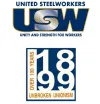This week in labor history: March 13-19

MARCH 13
1830 – The term “rat,” referring to a worker who betrays fellow workers, first appears in print in the New York Daily Sentinel. The newspaper was quoting a typesetter while reporting on replacement workers who had agreed to work for two-thirds of the going rate.
1884 – “The laborers on the Cape Cod ship canal refuse to work and say they will not return until better food is provided.” No further details were offered in this Trenton Times report.
1946 – A four-month UAW strike at General Motors ends with a new contract. The strikers were trying to make up for the lack of wage hikes during World War II.
MARCH 14
1863 – Fabled railroad engineer John Luther “Casey” Jones born in southeast Missouri. A member of the Railroad Engineers, he was the sole fatality in a wreck near Vaughan, Miss., on April 29, 1900. His skill and heroics prevented many more deaths.
1914 – Henry Ford announced the new continuous motion method to assemble cars. The process decreased the time to make a car from 12 and a half hours to 93 minutes. Goodbye, craftsmanship. Hello, drudgery.
1954 – The movie Salt of the Earth opens. The classic film centers on a long and difficult strike led by Mexican-American and Anglo zinc miners in New Mexico. Real miners perform in the film, in which the miners’ wives – as they did in real life – take to the picket lines after the strikers are enjoined. After months of union-busting activity, the union was decertified in September 2014.
MARCH 15
1887 – Official formation of the Painters Int’l Union.
1917 – Supreme Court approves Eight-Hour Act under threat of a national railway strike.
1948 – Bituminous coal miners begin nationwide strike, demanding adoption of a pension plan.
2002 – The Wall Street Journal begins a series alleging insider stock deals at the union-owned Union Labor Life Insurance Co. (ULLICO). After three years a settlement was reached with Robert Georgine, a building trades leader serving as ULLICO president and CEO, requiring him to repay about $2.6 million in profits from the sale of ULLICO stock, forfeit $10 million in compensation and make other payments worth about $4.4 million. All but two of the company’s directors were said to have profited from the deals.
MARCH 16
1960 – The United Federation of Teachers (UFT) is formed in New York to represent New York City public school teachers and, later, other education workers in the city.
MARCH 17
1890 – The leadership of the American Federation of Labor selects the Carpenters union to lead the eight-hour movement. Carpenters throughout the country strike in April; by May 1, some 46,000 carpenters in 137 cities and towns have achieved shorter hours.
1894 – A U.S.-China treaty prevents Chinese laborers from entering the U.S.
1968 – Staffers at San Francisco progressive rock station KMPX-FM strike, citing corporate control over what music is played and harassment over hair and clothing styles, among other things. The Rolling Stones, Joan Baez, the Jefferson Airplane, the Grateful Dead and other musicians request that the station not play their music as long as the station is run by strikebreakers.
2000 – Boeing Co. and the Society of Professional Engineering Employees in Aerospace (SPEEA) come to terms on a new contract, settling the largest white-collar walkout in U.S. history. SPEEA represented some 22,000 workers, of whom 19,000 honored picket lines for 40 days.
MARCH 18
1834 – Six laborers in Dorset, England — the “Tolpuddle Martyrs” — are banished to the Australian penal colony for seven years for forming a union, the Friendly Society of Agricultural Labourers. Some 800,000 residents of the United Kingdom signed petitions calling for their release.
1937 – Police evict retail clerks occupying New York Woolworth’s in fight for 40-hour week.
1970 – The Post Office’s first mass work stoppage in 195 years begins in Brooklyn and Manhattan and spreads to 210,000 of the nation’s 750,000 postal employees. Mail service is virtually paralyzed in several cities, and President Nixon declares a state of emergency. A settlement comes after two weeks.
1997 – The Los Angeles City Council passes the first living wage ordinance in California. The ordinance required almost all city contractors to pay a minimum wage of $8.50 an hour, or $7.25 if the employer was contributing at least $1.25 toward health benefits, with annual adjustments for inflation.
2005 – Walmart agrees to pay a record $11 million to settle a civil immigration case for using undocumented immigrants to do overnight cleaning at stores in 21 states.
2010 – As the Great Recession continues, President Obama signs a $17.6 billion job-creation measure a day after it is passed by Congress.
MARCH 19
1917 – U.S. Supreme Court upholds the constitutionality of the Adamson Act, a federal law that established an eight-hour workday, with overtime pay, for interstate railway workers. Congress passed the law a year earlier to avert a nationwide rail strike.
1962 – In an effort to block massive layoffs and end a strike, New York City moves to condemn and seize Fifth Avenue Coach, the largest privately owned bus company in the world.
1981 – Three workers are killed, five injured during a test of the Space Shuttle Columbia.
(Compiled by David Prosten, founder of Union Communication Services)
SharePrevious articleSt. Louis City Labor Club’s annual pinball tourney set for March 11Next article200,000 joined unions in 2022; more want to unionize